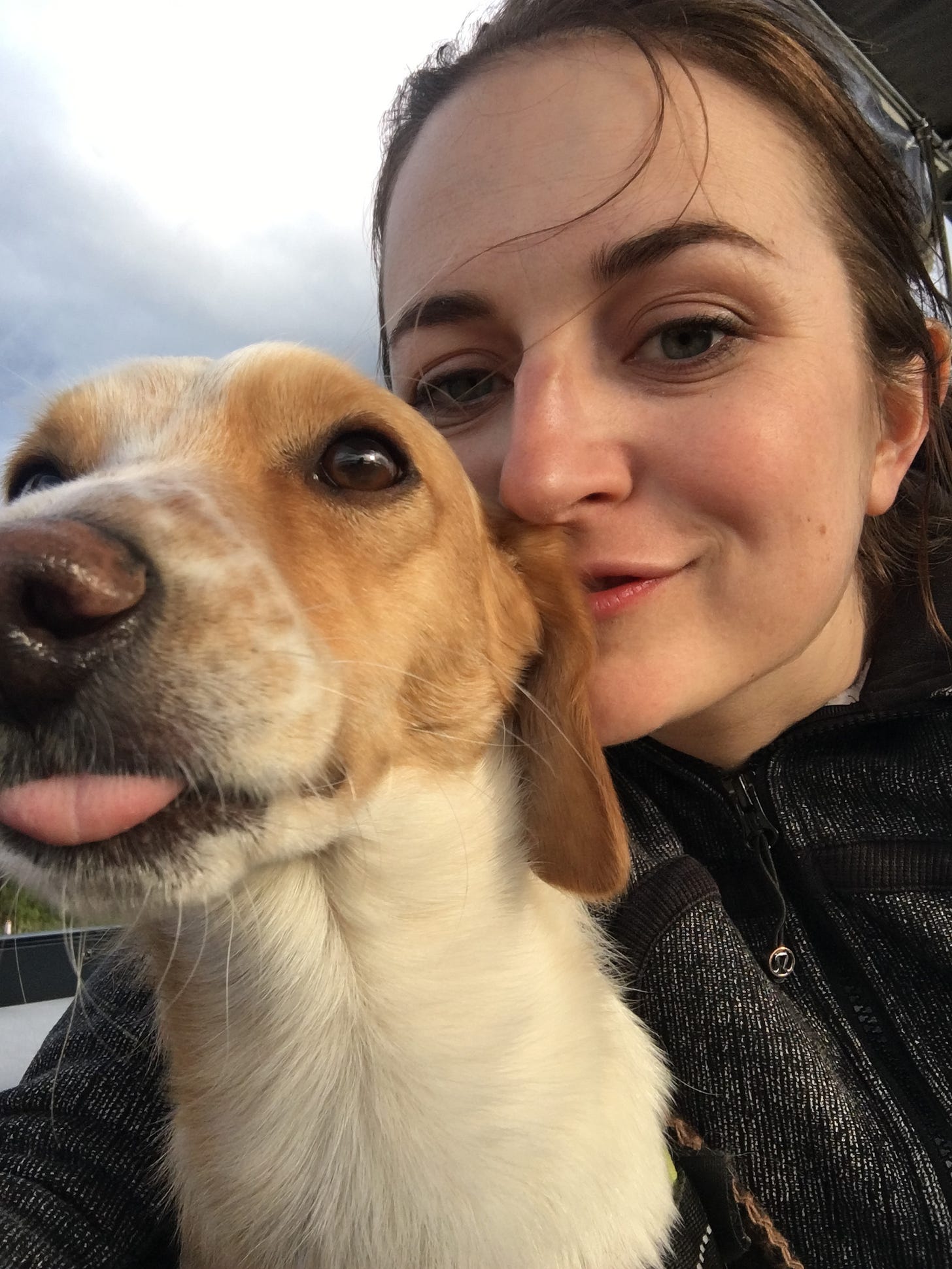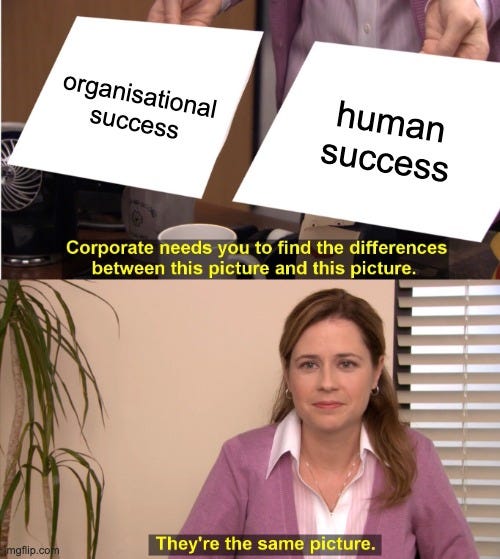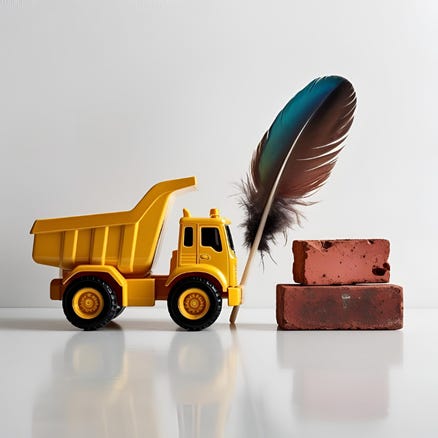The story of a burnout and a risky career bet
How surrounding yourself with incredible facilitators can change your life
[Updated May 2025] I’m briefly interrupting the alphabet as this week happens to be both #facilitationweek and #mentalhealthawareness week, so it felt like a good time to dust off this piece which combines the two themes. Lightly updated, but still essentially the same article. There’s a little addendum at the end about how things are going.
In late 2022 I burned out, hard. This triggered a depressive episode and I was signed off work for several months to let my brain and body recover. When it was written, I was emerging from a five month sabbatical and about to take the jump into freelance facilitation.
What happened in a nutshell
For months (maybe longer) I had been unknowingly suppressing a simmering burnout in the cracked pressure cooker of my emotional resilience.
The pandemic seclusion of a very sociable person - crack…
Professional identity crisis - crack…
Unhealthy levels of introspection - crack…
A war - CRACK…
Solastagia - the existential distress of climate change - CRACK!
Bodies are smart. If we don’t listen to them for long enough, eventually they will make us listen. My body won.
So I did something which may seem initially illogical. I quit my stable tech job with the intention of taking a few months off and then setting myself up as an independent facilitator.
You might think that facilitation is an odd choice of job for someone like yours truly who experiences relatively hefty bouts of anxiety because being a facilitator can feel pretty… exposed.
Exposed in a literal sense because you are quite often an outnumbered outsider operating in the unfamiliar jungle of another organisation. You are regularly working in high-stakes environments, dealing with power dynamics, interpersonal tensions, unarticulated needs, and the chaos that is working with humans in all their beautiful, creative messiness.
BTW this is me and my equally anxious pup, Snoop:
Being in such an exposed role makes a lot of people anxious. Human brains generally like control and predictability.
But apparently mine is ok without a belief that I can control everything in a group setting. Somehow when Little Miss Anxious here steps into a room to facilitate, she usually experiences a bizarre sense of serenity.
WTF?
My working assumption for the reason behind this is that spending a lot of time with incredible facilitators changes your fundamental beliefs about people and the potential of other humans, and yourself.
When you practise facilitation a lot, you learn that if you set the tone right and build a rapport with the participants they will support you right back. In times of deep disconnection like this post-pandemic world, this can feel like a warm bath.
Facilitation feels so different to other “exposed” activities because if you do it right, the gaze is almost never on you.
I’m not going to pretend that I never get stressed when I facilitate. I just find it interesting that, given how highly strung I am in other arenas, it doesn’t occur more often… for example, you have no idea how long it took to write this post; it is frankly obscene.
Self-awareness and growth
Facilitation also requires deep self-awareness. Besides dealing with the humanness of their participants, facilitators have to manage their own energy, regulate their own emotions and anticipate their own triggers. The better you understand yourself, the better you are going to be at doing your job and the more fun you are going to have. I’m pretty good at self-reflection but I can get still get stuck in introspection. I’m working on it.
Being a facilitator also requires a robust commitment to a growth mindset. I have my wobbles here but I find it easier to stick to a growth mindset when I recognise that what I am doing is really hard. The diversity of challenges in facilitation keeps me in an uncommon combination of secure in my competence while sufficiently humble and excited enough to practise.
The bet
My mental health is definitely better after my five month sabbatical. This has been an active recovery and a lot of work. But burnout rehabilitation is a journey with an unclear end.
Going into freelance facilitation is a gamble for someone who had a recent burnout and needs to be extremely mindful of their energy. Events are very energy-intensive, but at least they tend to be short. The calculation I am making is that a) I will be able to focus my energy into these short events and then rest and b) the events themselves will energise me.
I am well aware that there are definitely easier routes to earn a living where I could have a peaceful and steady job. However, from past experience I tend to pour myself into whatever I do. So, a job with definite peak times is much more likely to fit my deep need for intensity than any desk job. I know myself: if I work a desk job, I create the intensity for myself.
It’s a gamble because being a facilitator is, in my experience, not really something you can do without being pretty well grounded. Whereas you can sit at a computer and limp through a day of work when you are burned out (been there), a dynamic workshop environment is going to crash and burn if you don’t have the energy to keep up with it.
In summary: The reason I am placing my chips on this table is that I want to be well, and I’m committed to getting there.
I believe my chances of keeping my mental health are actually greater if I set myself a challenge where I know I have to be incredibly intentional about self-care in order to be able to perform at all, rather than taking the easy route. It will likely take an army of coaches, community, and the odd therapist to get me there, but frankly, who doesn’t need those?
I’m not being reckless. Talking about mental health challenges publicly is also part of my accountability strategy. I’ll stop if I need to, and I’m surrounding myself with wonderful people who have promised to kick my ass if I don’t look after myself.
Unleashing energy
Let’s talk for a second about the impact facilitation can have for other people and organisations.
I chose facilitation because I deeply believe in its potential to save other people’s energy.
Organisations want innovation, engagement, the ability to prioritise, collaboration… the list goes on. None of these can be achieved if we fail to recognise human energy and attention as our most valuable assets.
There’s nothing quite like a burnout to serve as a reminder that human energy is finite.
What gets me out of bed in the morning is that belief that I might be able to play a small role in ensuring the best ideas see the light of day. That I might be able to help people get what they need to done at work, and free them up to have energy left after work to do important things like be human. Work smart. Go home.
This burning world doesn’t have time for more shitty meetings. We need the best ideas on the table and to save our energy for action. It’s time to bring our A-game.
Let’s go.
So how’s it going in 2025?
It’s been nearly two years since I wrote this piece, and a great deal has changed. Building a business has been immensely challenging. I’m now on my second attempt, having closed my previous business last year. I am tired. Very tired. But tiredness is very different from burnout.
As I write this, I’m in Portugal, preparing to join a group of brilliant facilitators from a community I joined, many of whom I’ve yet to meet in person.
I remain convinced that we are, to a large extent, shaped by the people we surround ourselves with. I’ve been fortunate to learn from and be in the company of some truly exceptional individuals working in this field. In fact, more than I ever thought possible. I’ll also give myself some credit: I made the effort to follow the trail of breadcrumbs and it continues to take me great places.
That’s not to say there haven’t been moments where I came close to slipping back into the dark place I found myself a few years ago. But I’m learning to recognise the signs.
Feather, Brick, Dump Truck
One of the metaphors that has helped me understand how well I am recovering is the Feather, Brick, Dump Truck analogy (I believe it should be attributed to Johnny Miller).
The idea is about becoming sensitive enough to notice the early signs of burnout. The goal is to respond when you feel the lightest of touches (the feather), rather than waiting for something heavier to stop you. If you don’t respond to the feather, the brick comes next. Ignore that, and eventually the dump truck arrives.
My burnout in 2022 was most certainly of the dump truck variety. I was in such deep denial that it took the full weight of that impact before I finally allowed myself to seek the help I needed. In 2024, I’d say I dropped a brick on my foot. I noticed. I stopped. I’m proud of that. And in 2025, there have been moments where I’ve felt something more like tickles. Firm ones, at times. But I noticed those too. That, to me, is real progress.






Thanks for sharing, I didn’t know this was how you found yourself working in this way for yourself. I hadn’t heard of the feather, brick, dump truck analogy, but it’s a good one.